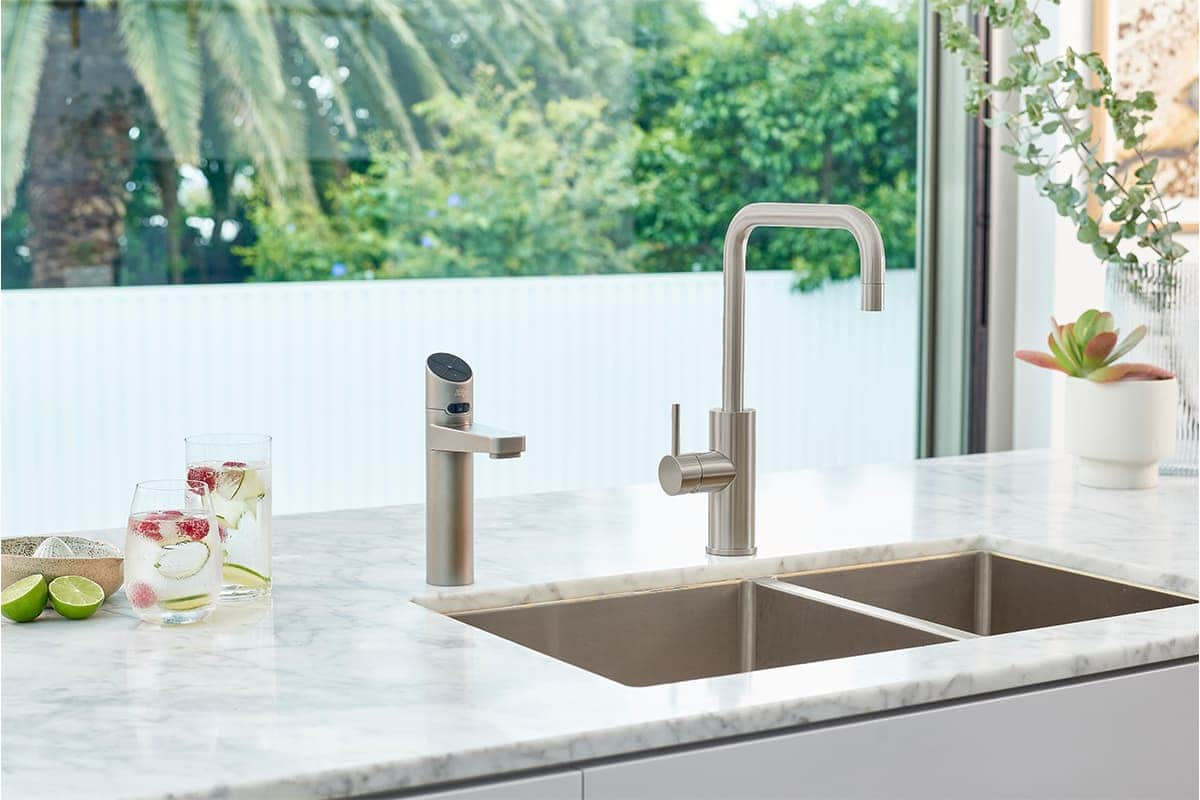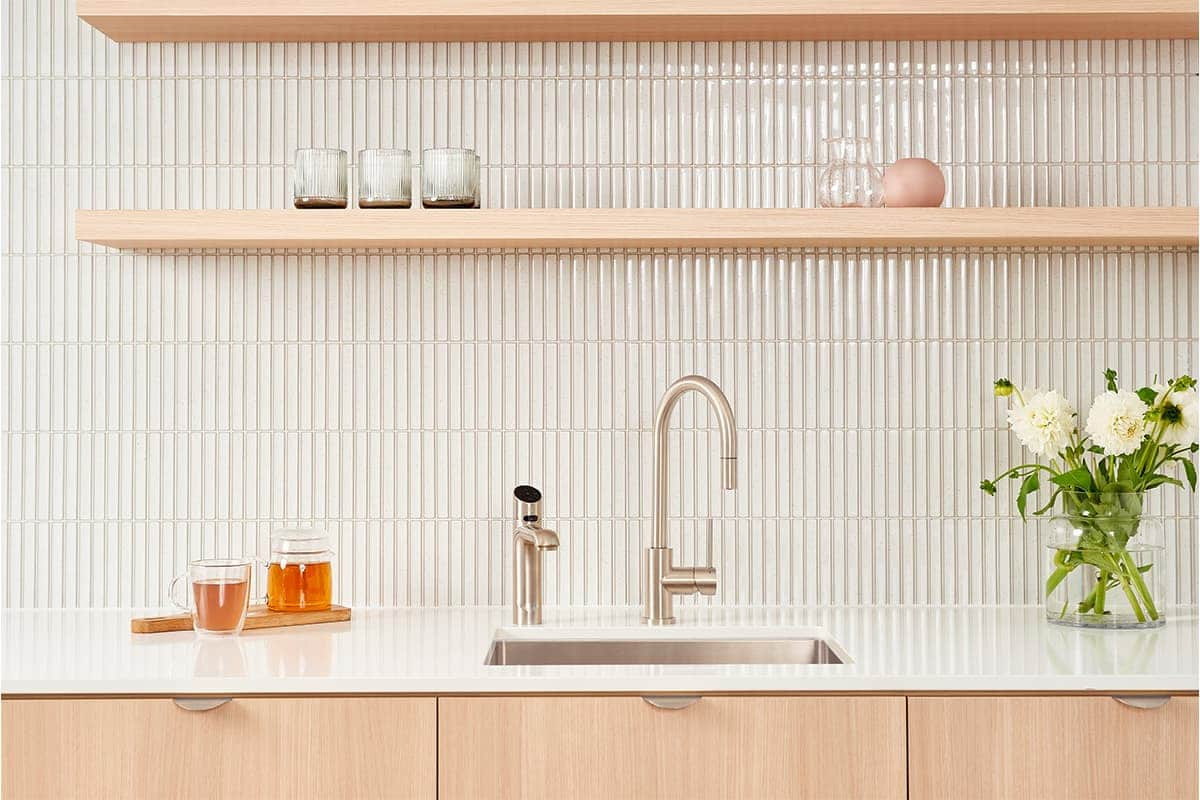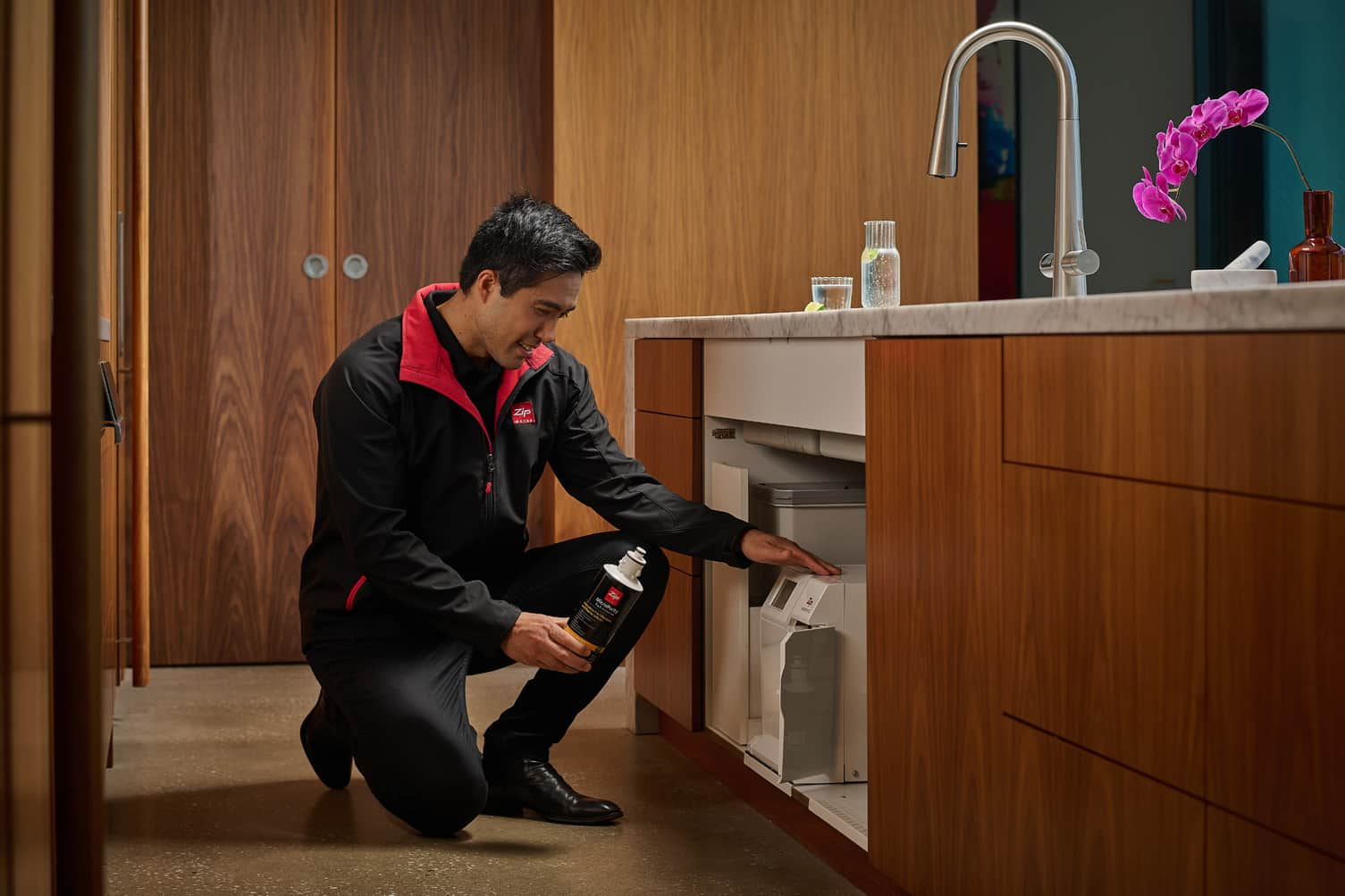Filtered Water vs. Tap Water: Which Is Better For You?
Design | 27-06-25

Australia’s tap water is among the safest in the world – strictly regulated, reliably clean, and readily available.
But still, the question lingers: Can we do more to improve what we drink? Is filtered water good for you?
In this guide, we’ll take a clear, practical look at the differences between filtered and tap water. What really changes when you use a filter? Does science back the health claims? And is it worth making the switch at home?
- Is filtered water good for you?
- Filtered water vs tap water
- Filtered water vs bottled water
- And some helpful FAQ
Let’s unpack the facts and help you decide what’s best for your water (and your wellbeing).
Is filtered water good for you?
In short, yes, filtered water can be good for you.
While tap water in Australia is safe to drink thanks to our
water quality management strategy
, high-quality filtration can remove additional substances that some people prefer to avoid – like chlorine, lead,
microplastics
and
PFAS
(also known as “forever chemicals”). Some systems also improve taste and odour, making drinking water enjoyable.
The health benefits of filtered water depend on the quality of the filtration system and the condition of your local water supply. But for many of us, it offers an extra layer of confidence, especially for families with young children, people with sensitivities, and those wanting to reduce their exposure to certain chemicals.
Filtered water isn’t essential for everyone. But it can be a worthwhile upgrade if you're looking for cleaner taste, fewer additives, or more control over what you're drinking.
Filtered water vs tap water: What’s the real difference?
Let’s start with the basics. Tap water in Australia is held to high
national standards
. It’s disinfected, tested regularly, and monitored by local water authorities. For most people, it’s perfectly safe to drink. But safe doesn’t always mean optimal.
Filtering your water removes potential contaminants, reducing your exposure to certain chemicals and particles. It can also change how your water tastes, smells, and feels.
Here’s a quick comparison to help you see the difference at a glance and decide if filtered water is good for you.
| Feature | Tap Water (Australia) | Filtered Water (High-Quality Systems) |
| Safety | Safe under Australian guidelines | Safe, with extra removal of certain substances |
| Contaminants removed | May contain chlorine, sediment, trace metals, PFAS | Can remove chlorine, lead, sediment, PFAS, microplastics (varies by filter) |
| Taste and odour | Can have chemical or metallic taste | Cleaner, fresher taste, reduced odour |
| Health benefits | Safe for general use | May support gut health, kidney function, reduced chemical exposure |
| Maintenance required | None | Filter changes (every 6–12 months typical) |
| Environmental impact | Low | Lower than bottled; no plastic waste |
| Cost over time | Very low | Low to moderate, depending on filter type |
| Fluoride | Retained | Retained or removed, depending on filter |
Keep in mind: not all filters are created equal. Some jug and tap-mounted models may only improve taste, while others (like advanced under-sink or plumbed-in systems) are designed to remove a broader range of contaminants.
Now, let’s look closely at what's in your tap water and why some Australians are choosing to filter it.
What’s really in your tap water?
Tap water in Australia is safe to drink. But that doesn’t mean it’s free from all impurities, or that everyone will love how it tastes.
Depending on where you live, your tap water might contain:
- Chlorine – added to disinfect and kill bacteria. It’s highly effective, but it can leave a chemical aftertaste.
- Fluoride – added in most areas to help prevent tooth decay. It’s safe at regulated levels and not removed by all filters.
- Sediment and rust particles – from older pipes or natural sources.
- Lead – typically from ageing plumbing, especially in homes built before the 1980s.
- Microplastics – tiny particles from packaging, clothing, and household products that have been found in water supplies worldwide.
- PFAS – known as “forever chemicals”, these are industrial substances that can be present in low levels in some water supplies. They’re persistent, and some research suggests they may pose health risks with long-term exposure.
For most people, these elements are present in very small amounts and well within safety limits. But if you're sensitive to taste, concerned about certain chemicals, or simply want more control over what you consume, filtering your water can offer an extra layer of reassurance.
Want to know more about your local supply? Learn more with our guide:
Is tap water safe to drink in Australia
? Or find a detailed water quality report for your local area:
So, that’s a bit about whether it’s better to drink tap water or filtered water. Next, let’s move on to what different filters actually do (and why they’re not all created equal).
What do water filters remove?
Not all water filters are built the same. Some are designed to improve taste. Others are built to tackle a much broader range of contaminants. So when it comes to health benefits and knowing whether filtered water is good for you, it all depends on the filter you choose.
Here’s a quick guide to what different filters can (and can’t) do.
Basic jug and tap-mounted filters
- What they remove: Mostly chlorine and odour, sometimes minor sediment
- What they don’t: Heavy metals, PFAS, microplastics, most chemicals
- Best for: Light taste improvement, short-term use
Fridge filters
- What they remove: Often just chlorine and taste-related compounds
- What they don’t: Microplastics, lead, PFAS, or finer contaminants
- Best for: Households that prioritise chilled water over filtration
Under-sink carbon filters
- What they remove: Chlorine, sediment, some lead and pesticides
- What they don’t: Usually not fine enough for PFAS or microplastics
- Best for: Everyday use, with moderate filtration needs
Advanced multi-stage or plumbed-in systems
- What they remove: Chlorine, lead, rust, sediment, PFAS, and microplastics (depending on certification)
- What they don’t: Very little – these are high-performance systems
- Best for: Health-conscious households wanting full-spectrum protection
When comparing options, filtration level matters. High-performance filters should work down to 0.2 microns, removing microplastics, bacteria, and most contaminants invisible to the eye.
💡 Tip : Worried about PFAS or microplastics? Check that the filter you're considering has been independently tested or certified to remove them. Learn more about filtration in our guide: How to filter tap water .
Now, how might filtered water support your health? Hint: it’s not just what it removes, but what it helps you do better.
Health benefits of filtered water
Filtered water can support your health – not just by what it removes, but by how it helps you build better habits.
Reduced exposure to chemicals
While tap water in Australia is safe, filtering can reduce trace amounts of chlorine, lead, asbestos and PFAS (also known as “forever chemicals”) that may still be present in low levels. According to the Australian Government , PFAS and asbestos may pose risks with long-term exposure.
Reduced exposure to bacteria and parasites
Some microorganisms, like Giardia and Cryptosporidium, are resistant to chlorine and can occasionally enter water supplies through natural sources. They can cause gastrointestinal illness, especially in children, older adults, or people with weakened immune systems.
For young children, people with sensitive digestive systems, or if you’re mixing baby formula, filtered water gives you confidence. You should still boil your water for formula prep, but filtering first can help reduce unwanted additives before you even reach that step.
Better taste, better hydration
Cleaner-tasting water is easier to enjoy. And you're likely to drink more of it when it tastes better. In fact, 80% of Zip HydroTap owners say they drink more water since installing their system. That’s good news for your digestion, energy and concentration.
A gentler option for sensitive users
For young children, people with sensitive digestive systems, or if you’re mixing baby formula, filtered water gives you confidence. You should still boil your water for formula prep, but filtering first can help reduce unwanted additives before you even reach that step.
Filtered water vs bottled water
At first glance, bottled water seems like the simplest option. It’s portable, familiar, and easy to grab on the go. But is it really the better choice? There are three main things to consider.
1. Quality and transparency
Bottled water might feel like the safer choice, but in Australia, it’s actually subject toless rigorous testing than your tap. According to Choice, some brands don’t even disclose full testing results or water sources. Filtering your own tap water at home means you know exactly where it came from – and what’s been removed.
2. Environmental impact
There’s no getting around it: bottled water creates waste. Even with recycling, single-use plastics have a significant environmental footprint. Producing, transporting and storing bottled water takes energy, and those bottles often end up in landfill or waterways.
Filtered water, on the other hand, cuts down on both plastic and emissions. It’s better for the planet and your kitchen bench.
3. Cost over time
Bottled water is expensive.
Sydney Water
estimates that one litre of bottled water can cost up to 2,000 times more than the same amount from the tap. Even when you factor in the cost of a quality filter, the savings add up fast.
So, is filtered water good for you and the planet? In most cases, yes. You’ll save money, reduce waste, and enjoy cleaner-tasting water – without relying on plastic bottles.
Next up, let’s look at your options for filtered water at home and what to consider when choosing the right system.
What are your options for filtered tap water at home?
From simple jugs to fully integrated systems, there’s a filter for just about every household. Here’s a quick guide to help you weigh your options.
| Type | Pros | Cons | Best for |
| Jug filters | Affordable, easy to use | Needs frequent refills and filter changes and has limited filtration performance | Occasional use or small households |
| Fridge filters | Built-in convenience | Limited filtration performance | Taste improvement only |
| Tap-mounted filters | Easy to install | Can be bulky and not very effective | Renters, basic needs |
| Under-sink systems | Better filtration, hidden setup | More involved installation | Everyday household use |
| Plumbed-in systems | Best performance, instant access | Higher upfront investment | Health-conscious homes |
Ready to see what high-performance filtration can look like in action? Meet Zip Water’s HydroTap.
Why more Australians are choosing Zip Water
If you’re looking for high-performance filtered water, the
HydroTap
is an easy upgrade – without adding clutter, extra steps or plastic waste.
Zip Water’s
MicroPurity filtration
filters down to 0.2 microns
. That’s fine enough to reduce eight of the most harmful contaminants you can't see, smell or taste in your water including microplastics, asbestos and lead – along with 99.4% removal of PFAS*. That means fewer contaminants, better taste, and real peace of mind.
But it’s not just what Zip Water takes out. It’s what we bring in.
A HydroTap gives instant access to pure-tasting
chilled, boiling and even sparkling water from a single tap
. No more waiting for kettles. No more fridge space lost to jugs or bottles. Just filtered water that’s ready when you are.
And because it’s fully integrated, there’s nothing extra sitting on your bench. Now doesn’t that bring calm back to your kitchen.
Still curious about your water? Explore the Zip Water HydroTap range or learn about water hardness and how it affects you in hard water vs soft water
FAQ: Is filtered tap water good for you?
Should you drink filtered water in Australia?
If filtered water is an option for you, then yes – especially if you want to reduce your exposure to substances like chlorine, lead, PFAS or microplastics. Tap water is safe to drink, but high-quality filtration can offer an extra layer of protection and improve taste.
Which is better, filtered water or bottled water?
For most Australians, filtered water is the better choice. It’s more affordable, better for the environment, and gives you more control over what’s in your glass. Bottled water can be convenient, but it’s up to 2,000 times more expensive than tap water and usually comes in plastic that’s used once and thrown away.
High-quality filtration removes impurities like chlorine, lead, sediment and even PFAS, while keeping the beneficial minerals your body needs. It’s a simpler, more sustainable way to enjoy clean, great-tasting water – without the cost or the waste.
Does filtered water remove fluoride?
Not always. Most standard filters retain fluoride. If you specifically want to remove it (which we don’t recommend), look for a system that lists fluoride removal in its specs. Zip Water filters are designed to retain fluoride.
Is filtered water worth it for your health?
For many people, yes. Filtered water can reduce chemical exposure and encourage better hydration by improving taste. It’s especially useful for families, people with sensitive digestion, or anyone wanting greater control over what they’re drinking.
* Zip MicroPurity filters sizes 1 and 1.5 (93701 and 93702) are certified to NSF/ANSI Standard 53 to reduce 99.4% of Total PFAS (average reduction).























